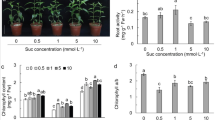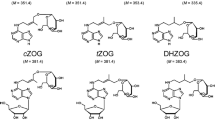Abstract
DEPENDING upon the concentration of the active substance, the effect of ascorbic acid upon the growth of seedlings may be either stimulatory or inhibitory. It has been noticed before1,2 that, at a given concentration, the effects of the synthetic product and of the acid crystallized from a natural source were not identical. We have endeavoured to investigate the reason for the discrepancy.
This is a preview of subscription content, access via your institution
Access options
Subscribe to this journal
Receive 51 print issues and online access
$199.00 per year
only $3.90 per issue
Buy this article
- Purchase on Springer Link
- Instant access to full article PDF
Prices may be subject to local taxes which are calculated during checkout
Similar content being viewed by others
References
L. Havas, NATURE, 136, 435 (Sept. 14, 1935).
L. Havas, NATURE, 136, 989 (Dec. 21, 1935).
Author information
Authors and Affiliations
Rights and permissions
About this article
Cite this article
HAVAS, L., GÁL, I. Divergent Physiological Effects of Synthetic and Natural Ascorbic Acids. Nature 138, 586–587 (1936). https://doi.org/10.1038/138586b0
Issue Date:
DOI: https://doi.org/10.1038/138586b0
This article is cited by
-
Effect of Organic Acids on Germination, Growth and Ascorbic Acid Content of Wheat Seedlings
Nature (1938)
-
Untersuchungen über Antithyreoid Wirksame Stoffe
Klinische Wochenschrift (1938)
-
Effects of Colchicin and of Viscum album Preparations upon Germination of Seeds and Growth of Seedlings
Nature (1937)
Comments
By submitting a comment you agree to abide by our Terms and Community Guidelines. If you find something abusive or that does not comply with our terms or guidelines please flag it as inappropriate.



